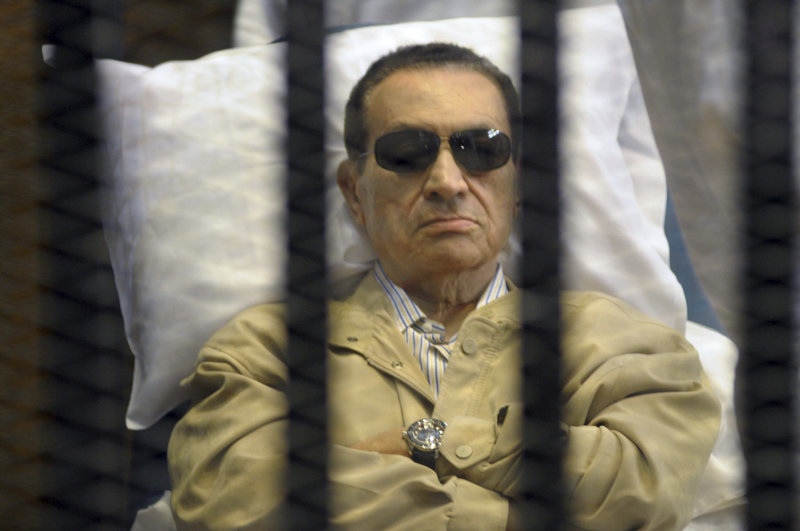CAIRO, Egypt – Tens of thousands of people converged on Cairo’s Tahrir Square Saturday night, not to celebrate the life sentence handed to deposed President Hosni Mubarak earlier in the day, but to try to resurrect a revolution that has suffered two major setbacks in a week — a presidential election in which no revolutionary candidate made it into the runoff and now a verdict that many feared would be overturned on appeal.
It was one of the largest crowds in Tahrir since Mubarak’s ouster 15 months ago, with protesters expressing shock that the judge had found Mubarak and his interior minister, Habib al Adly, guilty in the deaths of demonstrators in the uprising that led to Mubarak’s ouster, but had acquitted their deputies, including the head of the security forces responsible for the killings.
Many saw it as a verdict that protected the system that Mubarak had set in place.
“These guys are known evil symbols of the regime. Nobody thought they would walk,” said Omar Salama, 24, a technology shop owner standing in Tahrir.
The Mubarak verdict came as Egyptians were still trying to come to terms with the results of their country’s first democratic election a week ago that led to two polarizing finalists — including Mubarak’s last prime minister — in a runoff later this month. Both the election and the verdict were signals, the Tahrir crowd said, that each seemingly major milestone toward reform is clouded by split decisions and uncertainty. Rather than a revolution, so far, only the head of the state has changed, they said.
“For a long time, we felt the revolution was in trouble,” said Mohammed Abdel Karim, 32, one of the nearly 200 lawyers for the victims, who was in the courtroom when the verdict was read and later was in Tahrir Square. “As soon as I walked out of the courtroom, I told the police outside securing the building that there will be another revolution.”
By 10 p.m. the square was filled in a scene that recalled the heady days of the uprising that began on Jan. 25, 2011, and culminated with Mubarak’s ouster 18 days later. Once warring political groups merged into one as their partisans marched toward the square. The police and army were nowhere to be seen.
In his ruling earlier in the day, Judge Ahmed Refaat, head of the northern Cairo criminal court and a Mubarak appointee, had said that the prosecution never proved that Mubarak or al Adly had ordered the killings that took place between Jan. 25 and Jan. 31, 2011. But, he said, that because they were responsible for the security of the state, they were complicit for not stopping the killings.
As Refaat began handing down his ruling at the Cairo Police Academy on the outskirts of the capital, many believed he was about to hand a heavy sentence to Mubarak and his co-defendants. In almost Shakespearean Arabic, he described the uprising that ended Mubarak’s rule as a new dawn. Dozens of victim’s lawyers cheered as he began to speak.
But the courtroom fell silent as it became clear that the men Egyptians feel personally carried out the kill orders — Ahmed Ramzy, former head of the Central Security Forces, Adly Fayed, former director of General Security, and Ismail al Shaer, former director of security for Cairo — were being set free.
In a span of minutes, Egyptians experienced a wave of emotions that went from joy to rage, and the calls to move to Tahrir began.
“I thought I would be happy, and I was, but when I heard that everyone else was cleared, I realized this was just a plot,” to give the appearance of a government serving justice, said Soha Sayed, 43, who was carrying a poster of her husband, Osama, who was killed Jan. 28, 2011. “The regime is still in power. They can walk free today.”
Mubarak’s attorneys vowed to appeal, and both sides agreed the judge had given them ample grounds with his assertion that he had seen no evidence that they ordered the killings. Egyptian judges have broad powers to determine guilt or innocence and lay down verdicts.
Copy the Story Link
Send questions/comments to the editors.



Success. Please wait for the page to reload. If the page does not reload within 5 seconds, please refresh the page.
Enter your email and password to access comments.
Hi, to comment on stories you must . This profile is in addition to your subscription and website login.
Already have a commenting profile? .
Invalid username/password.
Please check your email to confirm and complete your registration.
Only subscribers are eligible to post comments. Please subscribe or login first for digital access. Here’s why.
Use the form below to reset your password. When you've submitted your account email, we will send an email with a reset code.